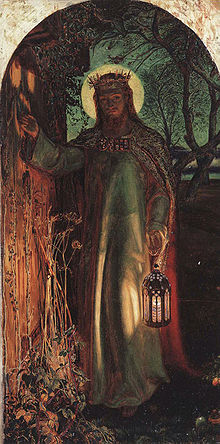4 Mar. The light of the world shines in the darkness
"Later, Jesus talked to the people again, saying, 'I am the light of the world. The person who follows me will never live in darkness but will have the light that gives life.'"
"The Pharisees said to Jesus, 'When you talk about yourself, you are the only one to say these things are true. We cannot accept what you say.'"
"Jesus answered, 'Yes, I am saying these things about myself, but they are true. I know where I came from and where I am going. But you don't know where I came from or where I am going.'"
"'You judge by human standards. I am not judging anyone. But when I do judge, my judgement is true because I am not alone. The Father who sent me is with me.'"
"'Your own law says that when two witnesses say the same thing, you must accept what they say. I am one of the witnesses who speaks about myself, and the Father who sent me is the other witness.'"
"They asked, 'Where is your father?' Jesus answered, 'You don't know me or my Father. If you knew me, you would know my Father too.'"
"Jesus said these things while he was teaching in the Temple [courtyards] near where the money is kept. But no one arrested him, because the right time for him had not yet come."
(John 8:12-20)

Jesus stayed on in Jerusalem after the Feast of Tabernacles in October 29AD and continued to teach in the courtyards of the Jewish Temple.
Unlike the other Jewish rabbis who taught solely about the Jewish scriptures, Jesus taught about himself. Recognising the darkness and wrongdoing in the Jewish society around him, he claimed that people should follow him, and accept the forgiveness and new life that God would give them:
"I am the light of the world. The person who follows me will never live in darkness but will have the light that gives life." (John 8:12)
This teaching was dynamite! The political situation in Palestine in 29AD was in many respects similar to the situation in Israel today. The very way of life of the Jewish people was threated by a hostile neighbour (the Romans in the 1st century AD), and the Jews turned desperately to the Old Testament scriptures to justify their very existence in Palestine. Yet their leaders were corrupt (like many Jewish politicians today) and the way in which they despised and mistreated non-Jewish people (e.g. the Samaritans) contradicted the very scriptures they spent so much time studying and extolling (just like the Jewish government's humiliating treatment of Palestinians today).
They forgot that God's promise to Jacob ('Israel') at Bethel was not only to "give you and your descendants the land on which you are now sleeping", but that "all the families of the earth will be blessed through you and your descendants" (Genesis 28:13-14). The Jews had turned this blessing into a curse on their neighbours (just like the situation in the occupied West Bank territories today), and when confronted by scriptures telling them to "love your neighbour as yourself", the Jews claimed (as many still do today) that this applied only to their fellow-Jews, not to their non-Jewish neighbours (see Luke 10:25-37).
So the scene was set for a head-on confrontation between the Jewish leaders' interpretation of God's commands (see Exodus 20:1-17) and Jesus's interpretation of the same scriptures (see, for example, John 7:23 & John 8:7). The same confrontation can be seen every day in Israel and Palestine today.
Then the situation was brought to a head when the Jewish leaders challenged Jesus's legal right to freely share his new interpretation of the Jewish scriptures. The Jewish leaders resorted to their own legal procedures: you cannot believe what a man says unless his words are backed up by the testimony of another.
Jesus said his words were indeed true because his Father also supported them. The Jewish leaders asked to see his father and hear his testimony. They assumed Jesus was referring to his 'human father'. But when Jesus implied that God was his Father, the dynamite exploded, and the Jewish leaders sought an opportunity to kill Jesus on a charge of blasphemy.
The photo shows the famous painting of 'The light of the world' by William Holman Hunt.
You can read more about Jesus's confrontation with the Pharisees @ https://www.thebiblejourney.org/…/jesus-claims-gods-person…/
